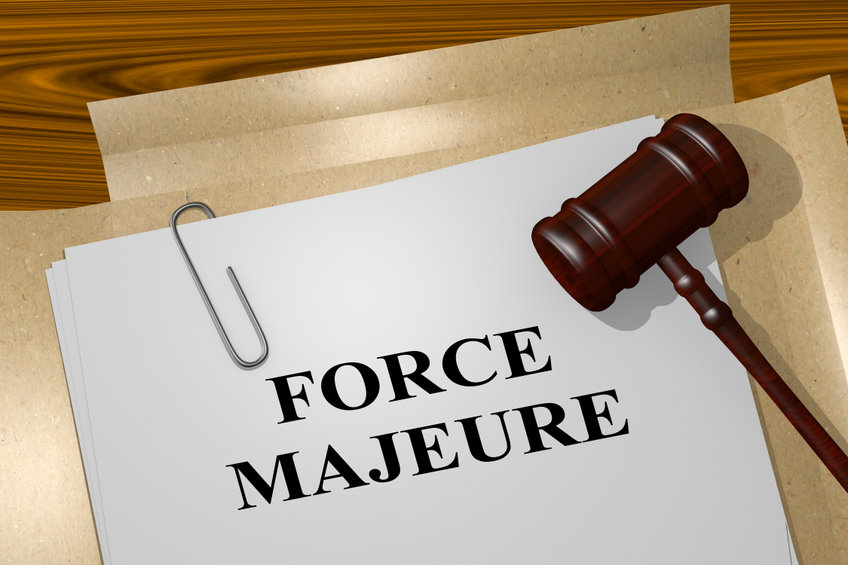Have you ever planned something and you are convinced that your plan is solid, only for life to throw you a curveball? Imagine signing a juicy business deal full of hope and expectation and thinking about how you will live the accomplishment phase of the deal only for something unexpected to come along and disrupt everything. These things often happen at one point or the other but could there be a way out? What could be our possible backup plan? This is where the concept of force majeure comes in.
Force majeure is a French term that simply means “superior force.” In the context of contracts, it refers to unforeseeable circumstances that prevent someone from fulfilling a contract. These are events beyond the control of the parties involved.
Think of force majeure as a legal get-out-of-jail-free card with some strict rules. It is that clause in your contract that acts as a safety net that you can fall into when things go south. I am talking about situations so out of control that it’s unfair to hold you accountable for not fulfilling your end of the bargain.
What Kind of Curveballs Are We Talking About?
Let’s get real. We’re not talking about your neighbour’s dog digging up your garden or your cat eating your last meal. Force majeure events are those big, bad things that disrupt life on a grand scale. Think floods that sweep away your warehouse, a sudden outbreak of a deadly disease that shuts down your business, or even a war that grinds your supply chain to a halt. These are the kind of curveballs that can leave you off balance.
Protecting Yourself: The Importance of Force majeure Clauses
Now, you might be wondering, “Why should I care about this legal jargon?” “Does it have anything to do with me?” Okay, let’s make this more relatable. Picture this: You’ve signed a contract to supply goods to a major client. A heavy downpour hits, thus causing flooding and, destroying your factory. Without a force majeure clause, you could be liable for breach of contract, even though the destruction was beyond your control. That’s where a well-drafted force majeure clause comes in handy. It protects you from bearing the brunt of these unforeseen circumstances.
Navigating the Legal Landscape
While force majeure is a recognized concept in Nigerian law, it’s essential to understand the specifics because understanding them could save you a lot of trouble. Courts have handled cases involving everything from natural disasters to government regulations. The key is to have a clear and comprehensive force majeure clause in your contracts. It’s like having a legal shield that protects you when the unexpected happens.
Practical Tips for Businesses
So, what can you do to safeguard your business?
- Get Legal Advice: Consult a lawyer to draft a solid and detailed force majeure clause tailored to your industry.
- Document Everything: Keep detailed records of every event that might qualify as force majeure.
- Communicate Effectively: If a force majeure event occurs, inform all parties involved promptly.
Remember, while force majeure can offer relief, it’s not a magic wand. It’s a tool to help you navigate challenging times. By understanding its intricacies and taking proactive steps, you can protect your business from the unexpected.
Force Majeure in Nigeria: Real-Life Examples
Let’s bring this legal concept to life with some real-world examples.
The COVID-19 Pandemic
The COVID-19 pandemic is a good case study of a force majeure event. Businesses across Nigeria faced unprecedented challenges due to lockdowns, economic downturns, and supply chain disruptions. Many businesses relied on force majeure clauses to renegotiate contracts, extend deadlines, or even terminate agreements without incurring penalties which they might have incurred without force majeure.
Flooding (Natural Disasters)
Nigeria is prone to natural disasters like floods and erosion. Imagine a construction company contracted to build a bridge. A devastating flood washes away part of the construction site. With a well-drafted force majeure clause, the company can claim relief from contractual obligations until the situation returns to normal.
Government Interventions: Unforeseen Policy Changes
Sometimes, government actions can disrupt business operations. For instance, new regulations or policy changes might make it impossible to fulfill a contract. A good example is the recent hike in fuel prices, which affected transportation costs for many businesses. In such cases, a force majeure clause could provide a lifeline for modifications of the terms of the contract.
Key Considerations in Force Majeure Claims
- Foreseeability: The event must be truly unexpected and unforeseeable.
- Impossibility: The event must make the performance of the contract impossible or radically different.
- No-Fault: The party claiming force majeure must not be responsible for the event.
- Mitigation: The affected party must take reasonable steps to mitigate the impact of the event.
- Notice: Timely notification of the force majeure event to the parties affected is crucial.
It’s important to note that these are hypothetical examples, and the outcome of actual cases would depend on the specific facts and circumstances, as well as the interpretation of the contract by the court.
While case law on force majeure might be limited in Nigeria, the principles underlying the concept are well-established. By understanding these principles and drafting comprehensive force majeure clauses in Agreements/Contracts, businesses can better protect themselves from the unexpected.
Disclaimer: While this blog post provides general information, it’s not a substitute for legal advice. It’s always recommended to consult with a lawyer for specific legal counsel






